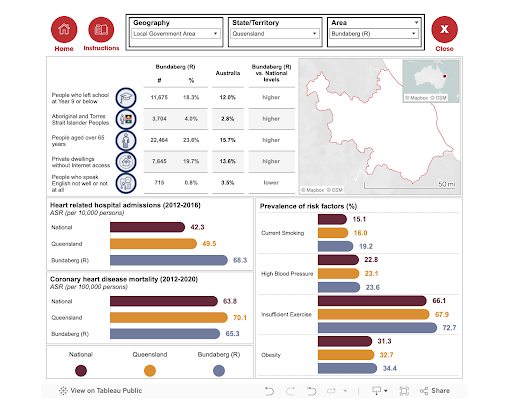Workforce: attracting more ophthalmologists to the regions
The current edition of Insight, the industry publication for eye
An article by Vikki Campion in the Saturday Telegraph of 19 April, syndicated to other publications nationally, brought the nation’s attention to the Bundaberg Cardiology group.
Bundaberg Cardiology was established by two South African emigres – Dr Andre Conradie in 2004 and Dr Hermann Wittmer in 2009. They have worked tirelessly over the years to develop high-quality interventional cardiology services in the Wide Bay region, centred at Bundaberg Cardiology in the Friendly Society Private Hospital.
The result of this dedicated work can be seen in the Australian Heart Foundation’s Heart Maps over this period. The current edition shows as follows:
Bundaberg follows the trend of increasing risk factors and incidence of heart disease with increasing distance from Capital cities. However it reverses this trend in mortality, with a post-heart attack survival rate to rival inner Metropolitan areas. The credit for this goes to the Bundaberg Cardiology group.

The trouble is, as the two principals approach retirement age, succession planning is thwarted by the reluctance of Australian graduates to go rural. So they continue to look overseas; most recently New Zealand. However the existing rules regarding district workforce shortages are based on Medicare Provider Number data. As previous short-term cardiologists who have worked in Bundaberg have not closed their Provider Numbers there, the Commonwealth considers that Bundaberg is oversupplied with cardiologists.
“One regional cardiology practice tried to hire a New Zealand-trained specialist, but he was rejected three times because, according to the federal health bureaucrats responsible for allocating Medicare provider numbers, the town he wanted to work in was apparently full of doctors.
‘Full’ is 1700 heart attack patients last year, sharing one and a half interventional cardiologists.
According to federal Health Minister Mark Butler’s office — in response to questions on notice by Hinkler MP Keith Pitt — the Wide Bay Burnett region in Queensland has enough cardiologists, failing to recognise that the only reason it has the specialists it does was because of the specialist hub established 10 years ago”, writes Campion.
Whilst the RMSA continues to support the "grow our own" model for rural and regional specialists, the situation in Bundaberg is approaching crisis point. It is likely that this issue will be discussed at our June annual general meeting in Mackay. We really hope that some continuity can be provided for the people of the Wide Bay, honouring the legacy of Conradie and Wittmer.
Funding Round 8
Support for Rural Specialists in Australia (SRSA) has just opened a new funding round! You can read the new guidelines and apply through our online portal below:
SRSA helps rural specialists feel confident, supported, and engaged so they can provide the best care to their communities.
We provide grants of up to $12,000 for individuals to attend CPD activities, covering costs like registration, accommodation, travel, and meals.
Key dates:
- Applications open: 28 Feb 2024
- Application deadline: 15 Apr 2024
- Outcomes sent by: 15 May 2024
- CPD activity completion: 1 Jul 2024 - 31 Dec 2024
Eligibility
Applicants must work rurally (Modified Monash Model categories 2-7) as either:
- A (non-GP) specialist
- An Aboriginal and/or Torres Strait Islander specialist trainee
- A specialist international medical graduate under assessment
FAQs
1. Can I complete my CPD activity overseas?
All activities must be completed within Australia or New Zealand. Online-only activities are also eligible.
2. What is the maximum amount I can apply for?
Grants are available up to $12,000 per person, per funding round.
3. Can I apply for multiple activities?
No. Grant funds cannot be split between multiple activities unless they are directly related (e.g., a workshop held in conjunction with a conference). Applications for multiple activities will not be considered.
4. How can I increase my chances in securing a grant?
We prioritise more hands-on and interactive activities like clinical attachments, mentorships, and peer review.
5. When do I receive the grant funds?
Successful applicants will be contacted in mid-May with a letter of offer. Funds will be transferred within six weeks of grant acceptance.
For more information head to the SRSA website or contact [email protected].
Help us spread the word
Most applicants hear about SRSA from colleagues. Please considering forwarding this email through your networks so we can reach as many rural specialists as possible.


Order of Australia - General Division Recipients
Dr. Nicholas Stephenson AM - Wagga Wagga - For significant service to medicine and to medical imaging training.
Dr Nick Stephenson was one of the RMSA’s founding Directors.
The current edition of Insight, the industry publication for eye
The Royal Australian and New Zealand College of Psychiatrists have
The President of the Regional Medical Specialists Association, Dr Peter
Click here to visit the publication at the Australian Government